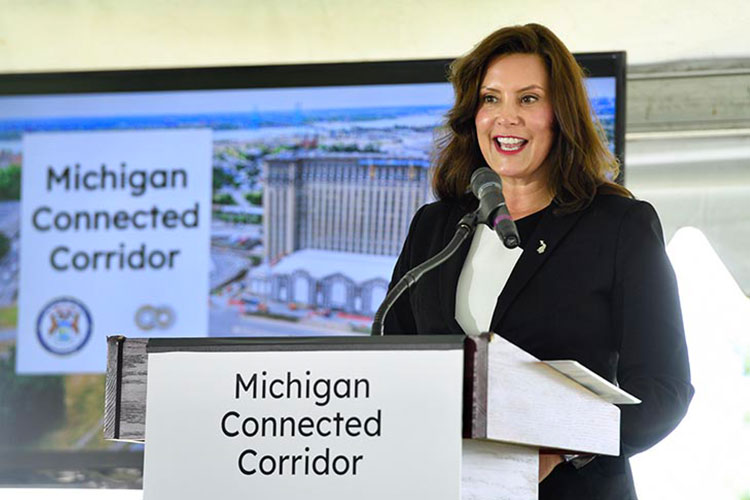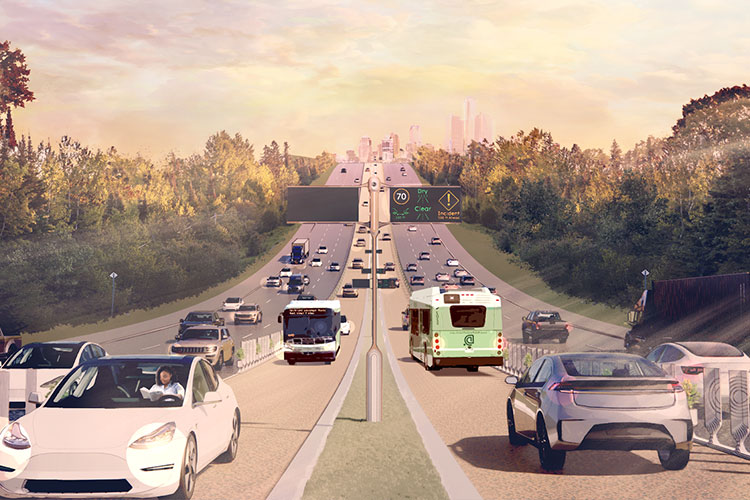
Cavnue/CAV Corridor
A first-of-its-kind connected and automated vehicle (CAV) corridor will help drive Michigan’s leadership in smart infrastructure and future mobility
In August 2020, Governor Gretchen Whitmer announced an initiative to develop a first-of-its-kind corridor for connected and automated vehicles (CAVs) designed to improve transportation for communities in Southeast Michigan. A key goal of the CAV Corridor was to future-proof Michigan roads for the transportation and mobility of people and goods across the state—including supporting transit along the corridor.
Cavnue, a leading developer of connected roadway and infrastructure technology, was selected by the state to serve as Master Developer of the Corridor and work closely with the Michigan Department of Transportation (MDOT), the Michigan Office of Future Mobility and Electrification (OFME), the Michigan Economic Development Corporation (MEDC), the Michigan Department of Labor and Economic Opportunity (LEO) as well as various industry and local project partners.
“Here in Michigan, the state that put the world on wheels, we are taking the initial steps to build the infrastructure to help us test and deploy the cars of the future,” said Governor Whitmer. “As we rebuild our roads to ensure every Michigander can drive to work and drop their kids at school safely, we will also continue working to build smart infrastructure to help prepare us for the roads of tomorrow. In Michigan, where the health of our workers and our economy are directly tied to the health of our auto industry, we will continue this innovative work to secure our state’s position as the automotive capital of the world.”

Immediately following the award, Cavnue and MDOT commenced an evaluation of the optimal route for the CAV Corridor. In April 2022 such evaluation concluded when Cavnue and the State of Michigan announced the location of the country’s first corridor of tech-enabled infrastructure for connected and automated vehicles, which will run along Interstate 94 in Southeast Michigan. Serving as the initial deployment of Cavnue’s infrastructure and technology products, the approximately 25-mile segment of I-94 was selected based on a study of traffic patterns and an assessment of existing infrastructure and investments made by the state and local communities, among other items. Deployment of this corridor will pave the way for a growing network of CAV Corridors connecting Southeast Michigan.
“There is no denying, the future of vehicles is connected and automated,” said Tyler Duvall, co-founder and CEO of Cavnue. “A network of CAV corridors powered by an integrated hardware, software and advanced roadway operation solution can ensure that the future is safe and efficient. Coupled with the industry leading center of excellence in automotive that calls Michigan home, it only makes sense to begin here and grow a network of CAV corridors across the rest of the country.”
Cavnue is working closely with several organizations that makeup the mobility ecosystem in Southeast Michigan, including Ford Motor Company, the University of Michigan, and the American Center for Mobility.
In addition, Cavnue has built partnerships with industry leaders, including through its advisory committee of automotive and autonomous mobility companies such as Argo AI, Arrival, Ford Motor Company, General Motors, Honda, Hyundai, May Mobility, Motional, Stellantis, Toyota, TuSimple and other private and public-sector partners.
In April 2022, Cavnue announced the closing of its Series A funding round of $130 million, led by SIP and Ford Motor Company, with additional investment from Openvia, the technology and innovation platform of the Globalvia Group, and Landstar System. These strategic industry relationships are built on the mutual understanding that tech-enabled infrastructure is needed to advance the scalability of autonomy at all levels and a mutual commitment to deploying automated vehicles safety on roads.
“With billions of dollars already invested in intelligent, connected and autonomous in-vehicle technology, Cavnue will take these technological advancements one step further by adding the roadway into the connected driving experience,” said Duvall. “By partnering with leading companies across the industry, Cavnue is working to build connected and autonomous vehicle corridors that enable transportation solutions with the potential to save lives by reducing crashes, boosting productivity by cutting time wasted in traffic and increasing access to personal and shared mobility.”
Cavnue’s momentum is not limited to its external engagements, as its internal capabilities have grown in parallel with its external successes. In the last 18 months, the company has opened offices in Detroit, the Bay Area and Washington D.C., and hired more than 50 new team members (and continues to hire), across software, hardware, machine learning, engineering, operations, HR, external affairs, and government relations — pulling from some of the biggest names in the industry as well as government agencies such as Federal Highway Administration, U.S. Department of Transportation, and Defense Advanced Research Projects Agency — all of whom are now focused upon building the future of roadway infrastructure.
This story is just beginning with Cavnue as the state looks towards upcoming milestones associated with deployment of the CAV Corridor. So what does the future look like for Cavnue?
Cavnue will continue working with its formal partners — including automakers and L4 trucking and transit companies — focused on building OEM-agnostic supportive infrastructure that will help fully realize the benefits of today’s ADAS features and the future of autonomy.
In Michigan, the state and Cavnue are committed to mutually developing an associated work plan, which provides for further traffic studies, environmental analysis, road design and operational planning, as well as public engagement and outreach exercises to ensure community involvement. Learnings and insight gathered from the I-94 deployment will be used to further evaluate future deployments on Michigan Avenue and across Southeast Michigan.
At the core of the company’s mission to bridge technology and road infrastructure to rapidly scale automated transportation solutions, Cavnue seeks to deploy roadway infrastructure technology that is designed to improve safety as well as the overall driving experience; achieve technology neutrality among automakers through standards-based approaches; and enhance accessibility, affordability, and equity for roadway users and residents. Ultimately, Cavnue is harnessing the power of technology to ensure safer roads for vehicles of the future.
To learn more about how Michigan is a leader in transportation mobility and electrification, visit www.michiganbusiness.org/mobility.
